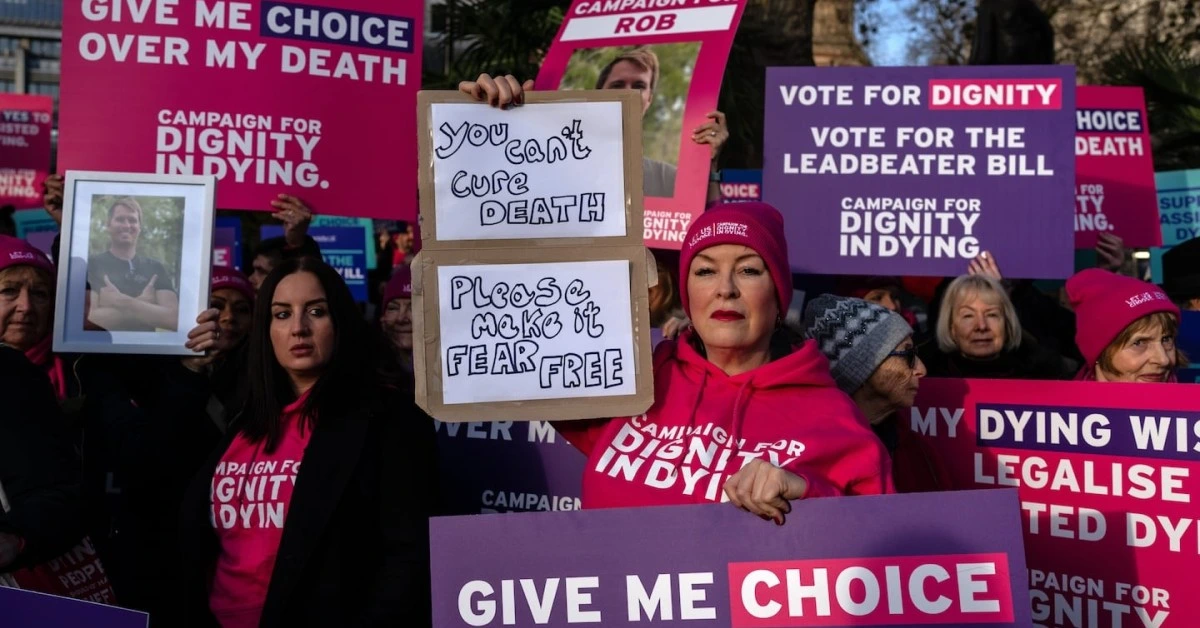
U.K. – British lawmakers have given preliminary approval to a controversial bill that would allow terminally ill adults in England and Wales to seek assistance in ending their lives.
The measure, passed by a vote of 330 to 275, followed an emotional debate in the House of Commons, where personal stories of loss and suffering took center stage. The bill will now undergo further scrutiny before a final vote.
Kim Leadbeater, the Labour MP sponsoring the bill, emphasized its focus on offering dignity and choice to dying individuals.
“Let’s be clear, we’re not talking about a choice between life or death; we are talking about giving dying people a choice about how to die,” she said.
Under the proposal, adults aged 18 and older with a prognosis of less than six months to live could request assistance to end their lives.
Strict safeguards include the requirement for the individual to self-administer the lethal drugs and obtain approval from two independent doctors and a High Court judge. The law would not extend to Scotland or Northern Ireland.
Supporters argued the bill would prevent unnecessary suffering, protect autonomy, and offer compassion to individuals in their final days.
Joshua Cook, a 33-year-old with Huntington’s disease, called the decision “a relief” and a step toward “a society that shows love and compassion above the need to just keep people alive.”
However, opponents raised concerns about potential coercion of vulnerable individuals, such as the elderly and disabled, who might feel pressured to end their lives to avoid burdening families.
Danny Kruger, an MP who led the opposition, warned against creating what he called a “state suicide service.”
He expressed hope that lawmakers might reject the bill in its final stages, noting that some MPs supported the measure only to scrutinize its details further.
The debate reflected divisions across political lines. While Labour leader and Prime Minister Keir Starmer expressed support, several members of his Cabinet, including Health Secretary Wes Streeting and Justice Minister Shabana Mahmood, voted against the bill. Similar splits occurred within other parties.
Long-time campaigner Esther Rantzen, who is terminally ill with lung cancer, celebrated the vote as a “wonderful” step toward giving people “equal choice.”
Rantzen has previously shared her intention to travel to Switzerland, where assisted dying is legal for non-residents, if no change occurred in U.K. law.
The bill’s introduction follows growing global acceptance of assisted dying. Countries such as Belgium, Canada, Australia, and parts of the United States have legalized it, though regulations vary widely.
Assisted dying differs from euthanasia, which involves a healthcare practitioner administering a lethal injection and is permitted in nations like the Netherlands and Canada.
Outside Parliament, hundreds of demonstrators gathered during the nearly five-hour debate. Opponents carried signs reading, “Kill the bill, not the ill,” and “NHS: cradle to grave, not ’til old, inconvenient, or expensive!”
Supporters, led by the group Dignity in Dying, countered with slogans such as “You can’t cure death. Please make it fear-free.”
As the crowd erupted in cheers following the vote, many supporters hugged and celebrated the historic step toward legalizing assisted dying in England and Wales.
While the bill’s future remains uncertain, it has already sparked a profound national conversation about choice, compassion, and the dignity of death.
XRP HEALTHCARE L.L.C | License Number: 2312867.01 | Dubai | © Copyright 2025 | All Rights Reserved